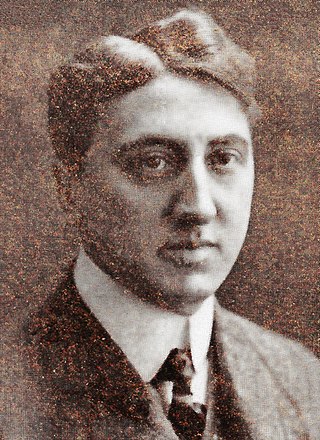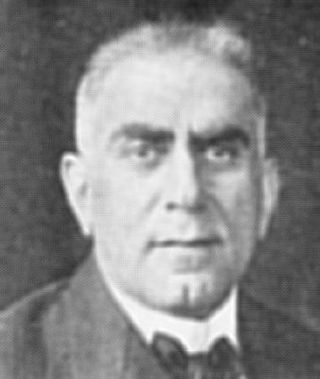
Stijn Streuvels, born Franciscus (Frank) Petrus Maria Lateur, was a Flemish Belgian writer.

Tom Lanoye was born on 27 August 1958 in the Belgian city Sint Niklaas. He is a novelist, poet, columnist, screenwriter and playwright. He is one of the most widely read and honoured authors in his language area, and makes regular appearances at all the major European theatre festivals.

Bernardus Johannes Alfrink was a Dutch Cardinal of the Roman Catholic Church. He served as Archbishop of Utrecht from 1955 to 1975, and was elevated to the cardinalate in 1960.

Adelqui Migliar, also known as Adelqui Millar, was a Chilean film actor, director, writer and producer. He appeared in 31 silent films between 1916 and 1928. He also directed 24 films between 1922 and 1954. He was born in Concepción, Chile, and lived and worked in the Netherlands, the United Kingdom and the United States. He died in Santiago, Chile.
Silvia Silombra is a 1913 Dutch silent drama film directed by Louis H. Chrispijn.
Het geheim van het slot Arco is a 1915 Dutch silent drama film horror directed by Maurits Binger and Jan van Dommelen.
Op hoop van zegen is a 1918 Dutch silent drama film directed by Maurits Binger.
De Kroon der Schande is a 1918 Dutch silent drama film directed by Maurits Binger, and produced by the Hollandia company.

Caroline van Dommelen was a Dutch film actress and director of the silent era. She appeared in 11 films between 1911 and 1918, and directed three during this time period. Several of her family members – including her brother, Jan van Dommelen – were involved in filmmaking.

Jan van Dommelen was a Dutch film actor of the silent era. He appeared in 44 films between 1911 and 1939.

Maurits Binger was a Dutch film director, producer and screenwriter of the silent era. He directed 39 films between 1913 and 1922 and is considered one of the pioneers of fictional films in the Netherlands. Binger's studio and base of operations was in Haarlem, North Holland. Between 1919 and 1923 he was managing director of Anglo-Hollandia an attempt to break into the larger British market. There is a film institute in the Netherlands in his name. He is sometimes referred to as Maurice Binger.

Willem van der Veer was a Dutch film actor of the silent era. He appeared in 32 films between 1913 and 1937.

Lola Cornero was a Dutch film actress of the silent era. She appeared in 17 films between 1916 and 1920.
Paula de Waart was a Dutch film actress of the silent era. She appeared in 24 films between 1915 and 1935.

Cornelis van der Aa was a bookseller in Haarlem when he was sentenced in 1796 by the schepenen of the city to five years of imprisonment and consecutive perpetual exile from the department in Holland for political reasons as he was a follower of the stadtholders. At the end of 1799, he was released and settled in Utrecht as a bookseller. From then on until his death in 1816 in Amsterdam, where he moved to later on, he spent his time writing books.

Camerata Trajectina is a Dutch early music ensemble.
Randall Christoph Herman Lesaffer is a Belgian historian of international law. He has been professor of legal history at KU Leuven since 1998 and at Tilburg University since 1999, where he also served as dean of Tilburg Law School from 2008 to 2012. He currently serves as the head of the Department of Roman Law and Legal History at the Faculty of Law and Criminology at KU Leuven. His work focuses on the Early Modern Age.
Adriaan Bonsel was a Dutch composer. He was born in Hilversum, Netherlands, and died at the age of 92 in Amersfoort, Netherlands.

Johan Hendrik Christiaan Basting was a Dutch army surgeon and friend of Red Cross founder Henri Dunant. He played an important role during the establishment in 1863 of the International Committee of the Red Cross (ICRC), and from that year on he was an advocate for the establishment of a national voluntary aid organization in the Netherlands, the Netherlands Red Cross established in 1867.
The Nienke van Hichtum-prijs is a biennial Dutch literary award for children's literature awarded by the Jan Campert-Stichting. The award is named after children's author Nienke van Hichtum and was first awarded in 1964. The winner of the prize receives €6,000.











